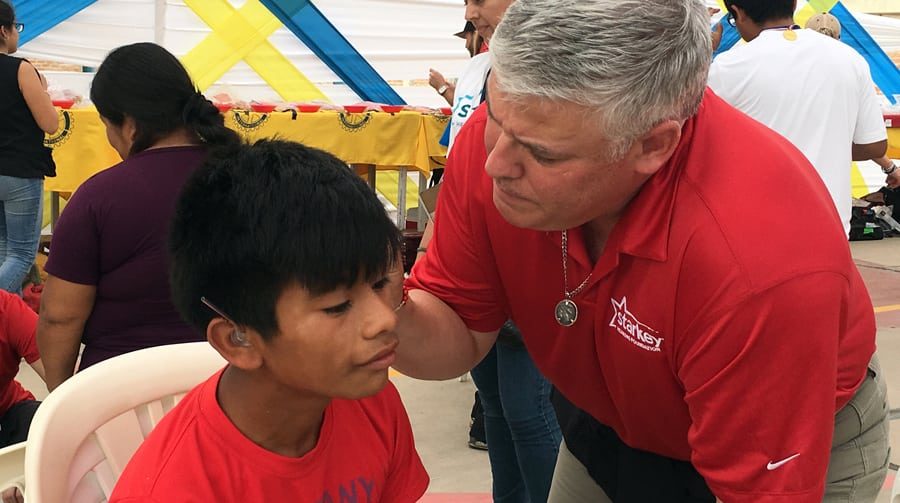
Home » Kennewick audiologist offers the joy of hearing across the globe
Kennewick audiologist offers the joy of hearing across the globe

January 11, 2016
Some consider the world full of annoying sounds — buzzing cell phones, honking cars, kids playing and people chattering.
[blockquote quote="Without hearing, you’re disconnected from the world." source="Dr. Neil Aiello, owner of Columbia Basin Hearing Center" align="right" max_width="300px"]
For others the world is silent.
Imagine if you’d never heard the first cries of a newborn or children’s laughter — any noise would be welcome.
“I consider hearing the most important social sense. Without hearing, you’re disconnected from the world,” said Dr. Neil Aiello, owner of Columbia Basin Hearing Center, which has offices in Kennewick, Richland and Walla Walla. He and his wife, Shannon, are both doctors of audiology at Columbia Basin Hearing.
For decades, Dr. Neil Aiello has devoted his life to helping the deaf and hearing impaired here in the Mid-Columbia.
In 2013, he started volunteering for the Starkey Hearing Foundation, which goes to third-world countries where people do not have access to modern health care to give them the gift of sound.
Starkey Hearing Technologies, based in Eden Prairie, Minn., is the only American-owned major hearing aid manufacturer in the world. Its philanthropic arm is the Starkey Hearing Foundation that travels the globe to fit more than 100,000 free hearing aids annually on people in need.
To do it, Starkey relies on volunteers like Aiello. In the past three years. Aiello has traveled to Mexico, Africa and most recently Peru, traveling each time with groups of other Starkey volunteers from across the U.S.
“Even though I’m volunteering my time, the trips are not free,” said Aiello.
The two-week trip to Peru cost Aiello about $10,000.
Aiello and his group flew into Lima and visited five small towns, fitting children and adults with hearing aids. As an audiologist, Aiello’s days are normally spent evaluating people’s hearing and fitting those who need them with hearing aids.
“The unusual thing about this Starkey program is the volunteers don’t have to be a doctor of audiology to fit these hearing aids in third-world countries. They’re trained, but aren’t necessarily medical personal,” Aiello said.
Aiello said there are about 10 to 12 volunteers fitting hearing aids at any one time. They begin about 9 a.m. and finish around 4 p.m.
“In one day, we can fit anywhere from 300 to 600 people,” he said.
Conditions where they work are usually primitive. Often Starkey volunteers set up in a tent in a sports arena.
Before the volunteers are sent to fit the hearing aids, Starkey sends teams to the various countries to contact the government agencies.
“Usually they’re puzzled and the first question the government officials ask is, ‘What do you want?’ The Starkey representatives have to explain that all we want to do is help. It’s what we do,” Aiello said.
The initial teams scout out the deaf and hearing-impaired in each region of each country. They do the silicon impressions of their ears, which are sent back to Starkey headquarters, where hearing aids are custom built for each individual.
The hearing aids that Starkey provides are basic analog-type hearing aids, much different that what is available in the U.S., Aiello said, but still very useful.
“I still get that heart-warming feeling of having helped someone hear for the first time or to hear better,” he said. “I consider this mission work 101. It’s my passion and what I enjoy doing.”
The Starkey Hearing Foundation has programs in approximately 100 countries.
“The really cool thing about the Starkey foundation is once they’re in a country, they don’t leave. They go back once a year and do after-care,” Aiello said.
Also, as the foundation has grown, Starkey has been able to hire local staff in each region to work for the foundation full-time providing after-care and resolving any hearing aid problems.
Bringing the gift of sound to people is truly a labor of love for everyone associated with Columbia Basin Hearing Centers.
In addition to Aiello’s volunteer work, his practice also works with the Starkey Hearing Foundation’s Hear Now program in the United States. Hear Now provides state-of-the-art Starkey hearing aids to people in financial need.
The staff at Columbia Basin Hearing Centers volunteers its time and equipment for fitting and follow-up care for the first year to fine-tune the hearing aids.
The hearing aids provided under Starkey’s Hear Now program aren’t free. There’s a $125 processing fee for each one. Sometimes the patient can pay the fee, other times the money is donated by Columbia Basin Hearing Center’s local Hearing Angels program.
Under the Hearing Angels program people can donate money towards paying the fees for Starkey’s Hear Now hearing aids.
Between the Walla Walla and Tri-City offices Columbia Basin Hearing Center fits 75 to 100 people a year with the Hear Now hearing aids from Starkey.
“And we always have a waiting list of two to three people,” Aiello said.
Columbia Basin Hearing Center also accepts used hearing aids.
“I guarantee we’ll find a way to use them,” he said.
[panel title="More Information" style="info"]
For more information on the Starkey Hearing Foundation programs, go to www.starkeyhearingfoundation.org. For more information about the Hearing Angels program, or to schedule a hearing test, go to www.ColumbiaBasinHearing.com or call ![]() 509-736-4005.
509-736-4005.
Local News Health Care
KEYWORDS december 2015





